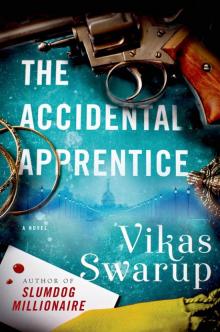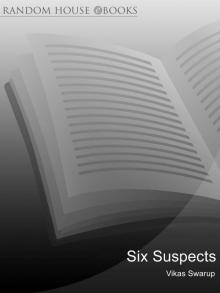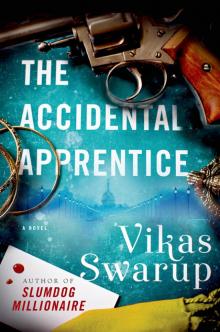- Home
- Vikas Swarup
Q & A
Q & A Read online
Table of Contents
Cover
Copyright
About the Author
Acclaim for Q & A
Dedication
Acknowledgements
Q & A
Prologue
1,000 The Death of a Hero
2,000 The Burden of a Priest
5,000 A Brother’s Promise
10,000 A Thought for the Crippled
50,000 How to Speak Australian
100,000 Hold On To Your Buttons
200,000 Murder on the Western Express
500,00 A Soldier’s Tale
1,000,000 Licence to Kill
10,000,000 Tragedy Queen
100,000,000 X Gkrz Opknu (or A Love Story)
1,000,000,000 The Thirteenth Question
Epilogue
This eBook is copyright material and must not be copied, reproduced, transferred, distributed, leased, licensed or publicly performed or used in any way except as specifically permitted in writing by the publishers, as allowed under the terms and conditions under which it was purchased or as strictly permitted by applicable copyright law. Any unauthorised distribution or use of this text may be a direct infringement of the author’s and publisher’s rights and those responsible may be liable in law accordingly.
Epub ISBN: 9781407070810
Version 1.0
www.randomhouse.co.uk
Q & A
A BLACK SWAN BOOK : 9780552772501
Originally published in Great Britain by Doubleday, a division of Transworld Publishers
PRINTING HISTORY
Doubleday edition published 2005
Black Swan edition published 2006
13 15 14 12
Copyright © Vikas Swarup 2005
The right of Vikas Swarup to be identified as the author of
this work has been asserted in accordance with sections 77
and 78 of the Copyright Designs and Patents Act 1988.
All the characters in this book are fictitious, and any
resemblance to actual persons, living or dead, is purely coincidental.
Condition of Sale
This book is sold subject to the condition that it shall not,
by way of trade or otherwise, be lent, re-sold, hired out or
otherwise circulated in any form of binding or cover other
than that in which it is published and without a similar
condition including this condition being imposed on the
subsequent purchaser.
Set in 11/13pt Melior by
Falcon Oast Graphic Art Ltd.
Black Swan Books are published by Transworld Publishers, 61–63 Uxbridge Road, London W5 5SA, a division of The Random House Group Ltd
Addresses for Random House Group Ltd companies outside the UK can be found at: www.randomhouse.co.uk/offices.htm
Printed and bound in Great Britain by
Cox & Wyman Ltd, Reading, Berkshire.
The Random House Group Limited makes every effort to ensure that the papers used in its books are made from trees that have been legally sourced from well-managed and credibly certified forests.
Our paper procurement policy can be found at:
www.randomhouse.co.uk/paper.htm
About the Author
Vikas Swarup is an Indian diplomat who has served in Turkey, the United States, Ethiopia and Great Britain. He is presently posted in the Ministry of External Affairs in New Delhi. Q & A is being translated into twenty-five languages and is due to be made into both a film and a stage musical. Vikas Swarup is writing a second novel.
www.booksattransworld.co.uk
Acclaim for Q & A:
‘Not simply the story of a quiz, but rather a reminder of the various, often apparently random, ways in which knowledge can be acquired by the adventurous, the curious and the observant . . . Swarup is an accomplished storyteller, and Q & A has all the immediacy and impact of an oral account.’ Daily Mail
‘An inspired idea . . . Through Ram’s life story, Swarup is able to give us snapshots of Indian society . . . at its most lurid and extreme. If the prose style suggests social realism, the spirit of the novel is cinematic, even cartoon-like . . . A broad and sympathetic humanity underpins the whole book. Perhaps that is why, when it was finally time for Ram’s good luck to hold, I was moved as well as relieved’ Sunday Telegraph
‘India is equally chaotic, enchanting and corrupt in this spirited novel’ Sunday Times
‘The premise of Vikas Swarup’s picaresque debut is enticing . . . His vivid characterisation covers the full social spectrum (prostitutes, glue-sniffers, film stars, diplomats, slum-dwellers), and paints a colourful, generous and admirably unvarnished portrait of contemporary India, where not all the poor are angels, not all the wealthy are villains’ Literary Review
‘Gloriously fantastical . . . the flashbacks he relates build into a picture of his life and of his remorselessly tough world: a mafia underworld that cripples children and trains them as beggars, arrogant whites oppressing their servants, families who prostitute a daughter, the dreary meanness of the rich, the desperate criminal measures to which poverty drives ordinary people’ The Times
‘I can see it all on the big screen now’ Mariella Frostrup ‘Open Book’ Radio Four
‘This page-turning novel reels from farce to melodrama to fairy-tale.’ You Magazine
‘More than a billion people live on less than a dollar a day. News like that could ruin your whole latte, but most of us are adept at ignoring such conditions . . . it takes more than a spoonful of sugar to get such medicine down, and Vikas Swarup provides a strange mixture of sweet and sour in this erratically comic novel . . . Through murders, robberies, rapes and close scrapes, Ram speaks in a voice that turns from wide-eyed innocence to moral outrage . . . but Ram never suggests the solution will come from a different political arrangement, more equitable distribution of wealth or social revolution. The real question is whether individuals will choose to treat one another more humanely, more selflessly. You can guess his final answer’ Washington Post
‘Swarup . . . writes humorously and keeps surprises coming. When it is turned into the movie it wants to be, Q & A will be a delight’ New York Times Book Review
‘A picaresque ride through the underbelly of urban India where evil hides in the most ordinary places . . . Despite an overdose of darkness, of the evil’s endless trysts with a boy, the novel is for the most part stripped of overt sentimentality. It is the terseness of narrative that gives the book a contemporaneity. It is the tale of the new millennium’s just-turned adults, the heirs to midnight’s overgrown children’ India Today
‘Behind the gauze of playfulness and ironic description, the reader can’t help but wonder whether Swarup is also trying to net a fish that’s swimming at a deeper level of the water. For at its core, Thomas’s story investigates the distinction made between knowledge and luck . . . a rollicking read as well as being a polished, varnished, finished work of impressive craftsmanship’ Hindustan Times
‘Truly gripping . . . the character of the protagonist is an everyday person with an atypical take on life . . . it epitomizes all that life is for the common man in India, for whom even an honest victory is uncommon, almost met with ridicule and disbelief . . . Read it and treasure it’ Financial Express
‘[For] galloping pace and sheer readability, you can’t put this book down . . . Given the ingenious simplicity of the plot’s framework – at once a comment on how TV contests pander to audiences in the age of avarice . . . he is also pointing at obvious ethical dilemmas in a country where divisions of caste, class and, above all, the wide abyss between rich and poor, nags at any notion of equality, education and social justice’ Outlook
‘An enthusiastic debut worth devouring. Vikas
Swarup weaves a delightful yarn . . . the story stays with the reader for its remarkable and magical story of a young boy who believes that “a waking dream is always more fleeting than a sleeping one”. So go ahead and read this enchanting tale of the good over the baneful’ Sunday Tribune
‘A bloody good book. No two ways about it . . . The characters we encounter in the novel, be it the guileless Salim, the dutiful Lajwanti, or Nita, the whore pining for redemption, are all stereotypical and yet entirely believable. It is easy to feel for them. It is also easy to wish for a ride into the sunset with them . . . a roller coaster ride – part quiz show, part morality tale’ Deccan Herald
‘Riveting drama . . . Ram’s life must pass through multiple filters, it must be told and retold in different ways. From the questions posed to him – and the record provided on the DVD – to his backgrounders for Smita, to the final tying up of all the loose ends, Ram is perhaps being put to a higher test. At the age of 18, his crowded life must be straightened out to disclose a compact honesty. For Swarup the quiz show is also a template to tell the story of modern India. It is a depiction with a moral edge’ Indian Express
‘A polished debut . . . bang on the publisher’s pulse. The linguistic style is simple, peppy and very Life of Pi. It is not often that we get such fast paced action, which, like a breathless express train, stops only at special stations, punch lines or when the quizmaster says, “You just won a 100 million rupees!”’ The Week
‘Swarup has achieved a triumph with this thrilling, endearing work which gets into the heart and soul of modern India’ New Zealand Herald
‘Just the book for a long journey. If you aren’t going away somewhere, don’t start if you intend to get any sleep at night’ Sydney Morning Herald
‘Stunning first novel set in modern day India. A moving, dark comedy, that crosses social boundaries to paint a picture of India as we have never seen it before’ Manly Daily
‘An intriguing story with a stinging touch of satire’ Daily Telegraph, Australia
For
my parents,
Vinod and Indra Swarup
and my late grandfather,
Shri Jagadish Swarup
ACKNOWLEDGEMENTS
This book would not have been possible without the support of Peter Buckman. I owe him a debt of gratitude for being friend, guide and agent, in that order. Thanks are also due to Rosemarie and Jessica Buckman, who put so much effort into making this debut a truly international one.
I must record my appreciation for Transworld, both for accepting this novel so enthusiastically and for giving me the best editor a writer could hope for. It was a treat working with Jane Lawson, who, over the course of some really long long-distance phone calls, made editing such a collaborative and enjoyable task.
Brigadier S. C. Sharma provided valuable input for ‘A Soldier’s Tale’. I would also like to thank Navdeep Suri, Humphrey Hawksley, Patrick French, Tejinder Sharma, Maureen Travis, the British public-library system and Google for helping out in various ways.
Above all, this book owes its existence to my wife Aparna and my sons Aditya and Varun, who gave me the space to begin this project and the strength to complete it.
PROLOGUE
I have been arrested. For winning a quiz show.
They came for me late last night, when even the stray dogs had gone off to sleep. They broke open my door, handcuffed me and marched me off to the waiting jeep with a flashing red light.
There was no hue and cry. Not one resident stirred from his hut. Only the old owl on the tamarind tree hooted at my arrest.
Arrests in Dharavi are as common as pickpockets on the local train. Not a day goes by without some hapless resident being taken away to the police station. There are some who have to be physically dragged off by the constables, screaming and kicking all the while. And there are those who go quietly. Who expect, perhaps even wait for, the police. For them, the arrival of the jeep with the flashing red light is actually a relief.
In retrospect, perhaps I should have kicked and screamed. Protested my innocence, raised a stink, galvanized the neighbours. Not that it would have helped. Even if I had succeeded in waking some of the residents, they would not have raised a finger to defend me. With bleary eyes they would have watched the spectacle, made some trite remark like ‘There goes another one,’ yawned, and promptly gone back to sleep. My departure from Asia’s biggest slum would make no difference to their lives. There would be the same queue for water in the morning, the same daily struggle to make it to the seven-thirty local in time.
They wouldn’t even bother to find out the reason for my arrest. Come to think of it, when the two constables barged into my hut, even I didn’t. When your whole existence is ‘illegal’, when you live on the brink of penury in an urban wasteland where you jostle for every inch of space and have to queue even for a shit, arrest has a certain inevitability about it. You are conditioned to believe that one day there will be a warrant with your name on it, that eventually a jeep with a flashing red light will come for you.
There are those who will say that I brought this upon myself. By dabbling in that quiz show. They will wag a finger at me and remind me of what the elders in Dharavi say about never crossing the dividing line that separates the rich from the poor. After all, what business did a penniless waiter have to be participating in a brain quiz? The brain is not an organ we are authorized to use. We are supposed to use only our hands and legs.
If only they could see me answer those questions. After my performance they would have looked upon me with new respect. It’s a pity the show has yet to be telecast. But word seeped out that I had won something. Like a lottery. When the other waiters heard the news, they decided to have a big party for me in the restaurant. We sang and danced and drank late into the night. For the first time we did not eat Ramzi’s stale food for dinner. We ordered chicken biryani and seekh kebabs from the five-star hotel in Marine Drive. The doddery bartender offered me his daughter in marriage. Even the grouchy manager smiled indulgently at me and finally gave me my back wages. He didn’t call me a worthless bastard that night. Or a rabid dog.
Now Godbole calls me that, and worse. I sit cross-legged in a ten-by-six-foot cell with a rusty metal door and a small square window with a grille, through which a shaft of dusty sunlight streams into the room. The lock-up is hot and humid. Flies buzz around the mushy remains of an over-ripe mango lying squished on the stone floor. A sad-looking cockroach lumbers up to my leg. I am beginning to feel hungry. My stomach growls.
I am told that I will be taken to the interrogation room shortly, to be questioned for the second time since my arrest. After an interminable wait, someone comes to escort me. It is Inspector Godbole himself.
Godbole is not very old, perhaps in his mid forties. He has a balding head and a round face dominated by a handlebar moustache. He walks with heavy steps and his overfed stomach droops over his khaki trousers. ‘Bloody flies,’ he swears and tries to swat one circling in front of his face. He misses.
Inspector Godbole is not in a good mood today. He is bothered by these flies. He is bothered by the heat. Rivulets of sweat run down his forehead. He smears them off with his shirt sleeve. Most of all, he is bothered by my name. ‘Ram Mohammad Thomas – what kind of a nonsense name is that, mixing up all the religions? Couldn’t your mother decide who your father was?’ he says, not for the first time.
I let the insult pass. It is something I have become inured to.
Outside the interrogation room two constables stand stiffly to attention, a sign that someone important is inside. In the morning they had been chewing paan and exchanging dirty jokes. Godbole literally pushes me into the room, where two men are standing in front of a wall chart listing the total number of kidnappings and murders in the year. I recognize one of them. He is the same man, with long hair like a woman – or a rock star – who had been present during the recording of the quiz show, relaying instructions through a headset to the presenter. I don’t kno
w the other man, who is white and completely bald. He wears a mauve-coloured suit and a bright-orange tie. Only a white man would wear a suit and tie in this stifling heat. It reminds me of Colonel Taylor.
The ceiling fan is running at full speed, yet the room feels airless in the absence of a window. Heat rises from the bleached white walls and is trapped by the low wooden ceiling. A long, thin beam bisects the room into two equal parts. The room is bare except for a rusty table in the centre with three chairs around it. A metal lampshade hangs directly over the table from the wooden beam.
Godbole presents me to the white man like a ringmaster introducing his pet lion. ‘This is Ram Mohammad Thomas, Sir.’
The white man dabs his forehead with a handkerchief and looks at me as though I am a new species of monkey. ‘So this is our famous winner! I must say he looks older than I thought.’ I try to place his accent. He speaks with the same nasal twang as the prosperous tourists I’d seen thronging Agra from far-off places like Baltimore and Boston.
The American eases himself into a chair. He has deep-blue eyes and a pink nose. The green veins on his forehead look like little branches. ‘Hello,’ he addresses me. ‘My name is Neil Johnson. I represent NewAge Telemedia, the company that licenses the quiz. This is Billy Nanda, the producer.’
I remain quiet. Monkeys do not speak. Especially not in English.
He turns to Nanda. ‘He understands English, doesn’t he?’
‘Are you out of your mind, Neil?’ Nanda admonishes him. ‘How can you expect him to speak English? He’s just a dumb waiter in some godforsaken restaurant, for Chrissake!’
The sound of an approaching siren pierces the air. A constable comes running into the room and whispers something to Godbole. The Inspector rushes out and returns with a short, corpulent man dressed in the uniform of a top-level police officer. Godbole beams at Johnson, displaying his yellow teeth. ‘Mr Johnson, Commissioner Sahib has arrived.’
Johnson rises to his feet. ‘Thank you for coming, Mr Commissioner. I think you already know Billy here.’

 The Accidental Apprentice: A Novel
The Accidental Apprentice: A Novel Six Suspects
Six Suspects Q & A
Q & A The Accidental Apprentice
The Accidental Apprentice